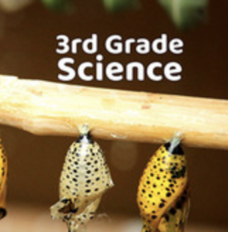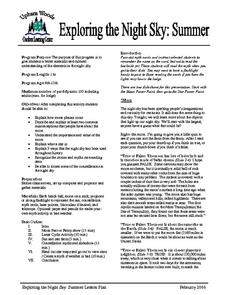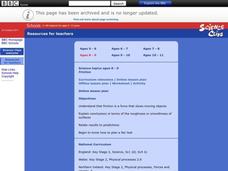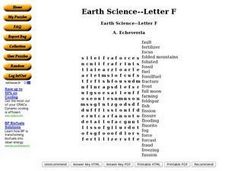Curated OER
Apollo Moon Landing
Students explore paper rockets, learn about the Apollo Program and Apollo spin-offs, and use simple office supplies to design and create a new useful product. This amazing plan is incredibly well written and leads students through a...
Curated OER
Orbits Worksheet #2
Brief, but beneficial, this resource draws space scientists into the orbit of a moon around its planet. Assignees answer five multiple choice style questions using a diagram of the planet, the moon's orbit, its focal points, and the...
Curated OER
Forces of Nature Vocabulary Quiz
In this science worksheet, students draw lines to match 13 words pertaining to forces of nature to their definitions in another column. Example: tornado, tide, erosion, pressure.
Curated OER
The Sun Affects Earth
Third graders read, write, and listen to information about the sun and its effects on the Earth.as it relates to its axis, orbit, rotate, and revolution. In this solar system lesson, 3rd graders examine how the sun effects the Earth's...
Curated OER
Who Wants to be a Millionaire? Solar System
Fifteen questions about our solar system make up this interactive review game. It was written by a teacher in the UK, and therefore the monetary winnings for answering correctly are in pounds. The content applies, however, to any...
Utah Education Network (UEN)
Utah Open Textbook: 3rd Grade Science
How do we interact with Earth? Scholars learn about the sun, Earth, moon, forces, gravity, and heat sources by reading a text and performing hands-on demonstrations. They also differentiate between living and non-living things using...
American Museum of Natural History
Meet the Universe's Main Attraction ... Gravity
Learners read a short description about gravity and what it does and then explore the two ideas about how gravity works. After gaining a better understanding of the concept, individuals participate in a thorough experiment on what would...
University of Colorado
Distance = Rate x Time
Every year, the moon moves 3.8 cm farther from Earth. In the 11th part of 22, classes use the distance formula. They determine the distance to the moon based upon given data and then graph Galileo spacecraft data to determine its movement.
Curated OER
Phases of the Moon: Cooperative Learning
Third graders examine the phases of the moon. In this moon phase lesson, 3rd graders listen to a read aloud of The Moon Seems to Change by Franklyn M. Branley and discuss the phases of the moon. They complete a moon phase calendar and...
Curated OER
Why is There a Tidal Bulge Opposite the Moon?
Students simulate how the Moon causes ocean tides. In this earth science instructional activity, students calculate gravitational acceleration using a mathematical formula. They compare the force of attraction between the Earth, Moon and...
Curated OER
Forces and Movement
Students examine types of forces and movements. They identify different causes that can affect movement and speed. They create their own predictions about they believe to be the outcome of an experiment.
Curated OER
Forces and Movement
Students investigate the forces of pushing and pulling by participating in a whole group activity involving a toy car. Students then participate in a small group experiment involving a toy car, small weights and various materials....
CK-12 Foundation
Newton's Apple
Scientists state that the higher something is above the earth, the greater the gravitational potential energy. Does this mean there is more gravity acting on the moon than on an apple falling from a tree? Scholars adjust the distance...
Curated OER
Earth, Moon, and Sun
In this earth, moon, and sun orbits worksheets, students will read the cause of four different events that focus on the earth's rotation around the sun and the moon's rotation around the earth. Then students will write in the effect of...
Curated OER
I'm Being Followed By a Moonshadow
Students explore solar and lunar eclipses and how the sun, Earth, and moon cause them.
Curated OER
Exploring the Night Sky: Summer
Students explain how moon phases occur. They describe and explain at least two common misconceptions that people have about the moon. Students explain what a star is. They explain 3 ways that the night sky has been used throughout history.
Curated OER
Tides
Students discover how the position of the Sun, Moon and Earth affect tides. In this science lesson, students view a presentation about the tides. Students discuss the different types of tides.
Curated OER
Black Holes and Tidal Forces
In this black holes and tidal forces worksheet, students solve 5 problems in which they find the tidal acceleration and answer questions about spaghettification.
Curated OER
Forces in Action
Young scholars investigate different forces and draw arrows to signify specific directions of force. Students are then shown a brick and they are asked to draw a diagram which will include labels for the forces that are acting on the...
Curated OER
Newton's Second Law
In this Newton's second law worksheet, students read about force, mass and acceleration and how they relate. They solve eighteen problems using Newton's second law.
Curated OER
How Do Things Fall?
Students study forces by examining the force of gravitational attraction. They observe how objects fall and measure the force of gravitational attraction upon objects. Students discover that, since gravitational constants are different...
Curated OER
Friction
Students explore friction as a force that slows moving objects, explain conclusions in terms of the roughness or smoothness of surfaces, relate results to predictions, and begin to know how to plan a fair test.
Curated OER
Friction
Young scholars compare and contrast the movement of objects on different surfaces, experimenting with friction and forces of motion. This friction lesson has numerous online tools including worksheets and virtual activities; the option...
Curated OER
Earth Science--Letter "F"
For this earth science worksheet, students locate and identify vocabulary terms related to earth science that begin with the letter "F." There are 24 words located in the puzzle.

























